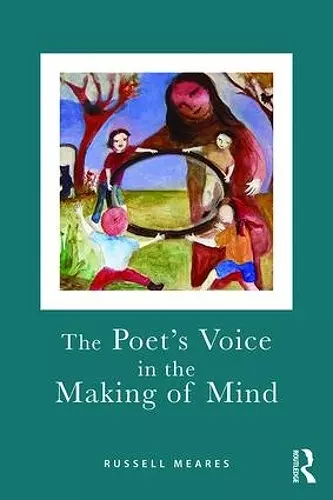The Poet's Voice in the Making of Mind
Format:Paperback
Publisher:Taylor & Francis Ltd
Published:18th Mar '16
Currently unavailable, and unfortunately no date known when it will be back
This paperback is available in another edition too:
- Hardback£135.00(9780415572330)

How did the human mind evolve and how does it emerge, again and again, in individual lives?
In The Poet’s Voice in the Making of Mind, Russell Meares presents a fascinating inquiry into the origin of mind. He proposes that the way in which mind, or self, evolved, may resemble the way it emerges in childhood play and that a poetic, analogical style of thought is a biological necessity, essential to bringing to fruition the achievement of the human mind. Taking a fresh look at the language used in psychotherapy, he shows how language, and conversation in particular, is central to the development and maintenance of self. His theory incorporates the ideas from William James, Hughlings, Jackson, Janet, Hobson, Gerald Edelman, Wolf Singer, Vygotsky and others. It is illuminated by extracts from literary artists such as Wallace Stevens, W.S. Merwin, Virginia Woolf, Joseph Conrad and Shakespeare.
Encompassing psychotherapy; psychoanalysis; evolution; child development; literary criticism; philosophy; studies of mind and consciousness, The Poet’s Voice in the Making of Mind is an engaging, ground-breaking and thought-provoking work that will appeal to psychotherapists and psychoanalysts, as well as anyone interested in the emergence of mind and self.
The Poet’s Voicein the Making of Mind is a truly monumental work, the product of Meares’ lifetime exploration of the development of symbolization, language, and the self. It is a beautifully written book in which Meares speaks with the unassuming intelligence of the finest of teachers. Meares brings to life, in a highly thought-provoking way, aspects of the work of William James, Edelman, Geertz, Cassirer, Trevarthan, Vygotsky, Hughlings Jackson, Hobson and other major contributors to the study of human development. But the triumph of this book lies in Meares’ ability to encompass their ideas and the voices of poets, as well as his own original contributions, and to go on to offer a unifying conception of the development of symbolization, language, self, and culture—a unifying view that the reader will find nowhere else. This is one of the finest books I have read on the subject of what is uniquely human. - Thomas Ogden
This beautifully written book is rich in information for psychotherapists, psychologists, neuroscientists, as well as philosophers and physicists, on the poetry of life. Russell Meares’ humanism transcends disciplinary boundaries, offering a picture of the developing personal self as made for discovery of joy in intimate and responsive company; for sharing the symbolic "make believe" of culture. The emotional foundations of metaphor he finds in the melody of mothers’ conversations with infants gives hope for those who have suffered extreme misfortune in living and sharing life, a way to help them recover self-confidence and a feeling for the common sense of life. - Colwyn Trevarthen, Emeritus Professor of Child Psychology and Psychobiology, Department of Psychology, The University of Edinburgh, Scotland, UK
In this remarkable feat of scholarship, Russell Meares offers a large body of evidence from science, including very recent neuroscience, physics, cognitive science, developmental psychology and anthropology, in order to more deeply elucidate the central questions about the human condition long addressed by poetry, literature, and philosophy. Utilizing an interpersonal neurobiological perspective, he offers a compelling central thesis, that right brain-to-right brain affective communications between mother and infant in early proto-conversations play an essential role in the development and expression of not only all later emotional functions, but also higher cognitive functions, including symbolization, metaphor, music, poetry, higher forms of consciousness, and indeed the self and culture. This groundbreaking integrative work represents a creative interdisciplinary bridge between the sciences and humanities. - Allan N. Schore, Ph.D., Department of Psychiatry and Biobehavioral Sciences, University of California at Los Angeles David Geffen School of Medicine
ISBN: 9780415572347
Dimensions: unknown
Weight: 440g
238 pages